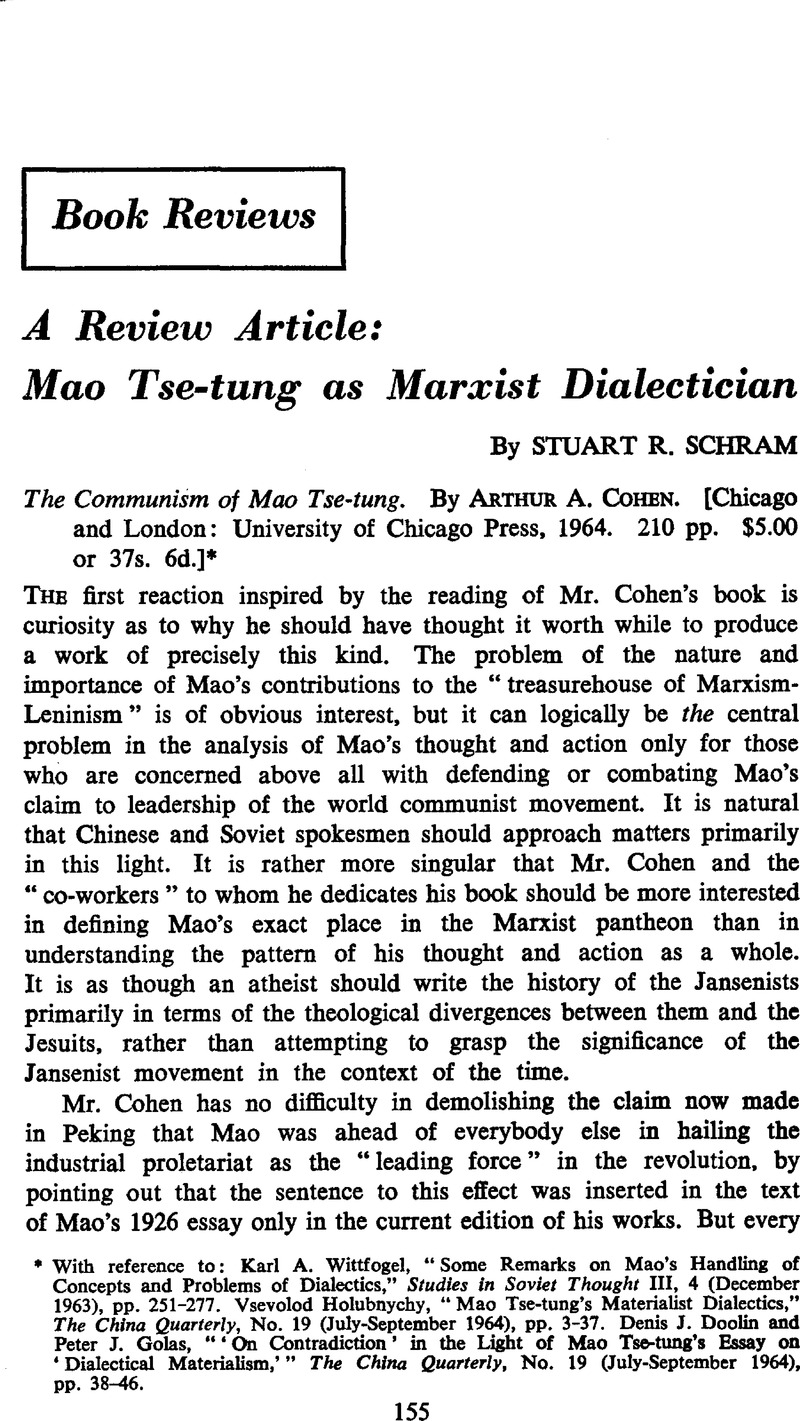Article contents
The Communism of Mao Tse-tung. By Arthur A. Cohen. [Chicago and London: University of Chicago Press, 1964. 210 pp. $5.00 or 37s. 6d.]*
Published online by Cambridge University Press: 17 February 2009
Abstract

- Type
- Book Reviews
- Information
- Copyright
- Copyright © The China Quarterly 1967
References
* With reference to: Wittfogel, Karl A., “Some Remarks on Mao's Handling of Concepts and Problems of Dialectics,” Studies in Soviet Thought III, 4 (12 1963), pp. 251–277CrossRefGoogle Scholar. Holubnychy, Vsevolod, “Mao Tse-tung's Materialist Dialectics,” The China Quarterly, No. 19 (07–09 1964), pp. 3–37CrossRefGoogle Scholar. Doolin, Denis J. and Golas, Peter J., “‘On Contradiction’ in the Light of Mao Tse-tung's Essay on ‘Dialectical Materialism,’” The China Quarterly, No. 19 (07–09 1964), pp. 38–16CrossRefGoogle Scholar.
1 Leninskij sbornik XI, 1929, p. 357Google Scholar.
2 Compare Cohen, pp. 140–141, with Shirokov, M., A Textbook of Marxist Philosophy (London: Gollancz, 1935), p. 175Google Scholar.
3 Stalin, , Voprosy Leninizma (11th ed.), p. 512Google Scholar.
4 Rozental', M., Marksistskij dialekticheskij metod (Moscow: Gospolitidat, 1951), p. 292Google Scholar.
5 Ibid., p. 291.
6 Shao-ch'i, Liu, Lun Tang (Dairen: Ta-chung shu-tien, 1947), pp. 133–134, 142Google Scholar. Edition of Lun Kung-ch'an-tang-yüan ti Hsiu-yang (even of the first of the three successive versions) published for general circulation normally contain only the first two chapters. Thus, when I cited the second paragraph of the above passage in The Political Thought of Mao Tse-tung I had not yet identified the text I was then using as Chapter III of How to Be a Good Communist. Similarly Schurmann, Franz, who was the first to refer to this work in Liu's in print (“Organizational Principles of the Chinese Communists,” The China Quarterly, No. 2, p. 50)Google Scholar, and who very kindly called my attention to it, had seen only a mimeographed edition published separately by the Malayan communists. The first edition of Chapter III known to me was published by the Hsin-hua Shu-tien (Chi-chung Chih-tien) under the title Hsü Lun Kung-ch'an-tang-yüan ti Hsiu-yang (More on How to Be a Good Communist). This edition is undated, but probably appeared shortly after Liu delivered the talks of which it is a stenographic report; it is a companion volume to the edition of Chapters I and II published by the Hsin-hua Shu-tien on November 7, 1939. A French translation of all three chapters, with indication of the variants in the successive versions of Chapters I and II, will be published by the Fondation Nationale des Sciences Politiques. In the light of recent events, it is of interest to note that in a letter written in 1940 or 1941, Liu Shao-ch'i showed himself totally unimpressed by Mao's contribution to Marxist theory. (See my article in the Revue française de science politique, no. 6, 1965, p. 1085.) The whole subject of the relations between Mao Tse-tung and Liu Shao-ch'i since the 1920s deserves much more thorough study than it has hitherto received.
- 5
- Cited by




